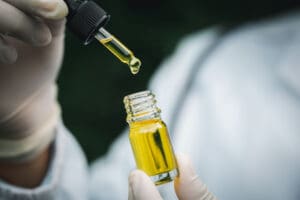CBD (cannabidiol) has taken more of the cannabis spotlight as it has gained popularity among patients for its therapeutic potential and minimal side effects. CBD is an isolated compound from cannabis that can be used for many ailments such as insomnia, pain, anxiety, epilepsy etc. However, much of the information available online fails to evaluate CBD comprehensively for safety concerns. Before we jump into a deeper analysis of CBD, it’s important to understand the cannabis basics.
Cannabis contains hundreds of compounds, however there are two main active ingredients: THC (tetrahydrocannabinol) and CBD (cannabidiol). All the compounds in the cannabis plant work together to create an overall “entourage effect”, which produces the largest clinical effect. This theory implies that cannabis isolates such as THC or CBD alone result in less effective treatment compared to using the whole plant. However, there are situations where a cannabis isolate like CBD would be preferred treatment.
CBD is theorized to work by antagonizing or potentiating the effects of THC in different areas of the body. It also affects several ion channels, receptors and enzymes to produce its effect; however, the exact mechanism of action has not yet been mapped out. Further research is needed to fully understand the complex interaction of CBD and the body.
CBD’s biggest selling point is that it does not cause a “high”, which is quite different than its sister chemical THC. Many patients have moved away from using cannabis due to the fear of accidentally getting intoxicated from the THC component. However, most concerns regarding cannabis intoxication don’t apply to medicinal cannabis because medicinal doses of cannabis are significantly lower than recreational doses. If medicinal cannabis is used appropriately, patients should not use a dose large enough to cause significant impairment. However, some patients find using medicinal cannabis intimidating because they have difficulty dosing appropriately. For these patients, CBD is a good alternative because it is easier to dose and has almost no potential to cause accidental intoxication.
Below is a table outlining the pros and cons of CBD:
|
Pros |
Cons |
|
Minimal side effects. Most clinical studies report mild to no side effects. Some reported side effects were reduced/increased appetite, weight gain/loss, and tiredness. |
Unknown long-term effects. CBD extracts are relatively new on the market, therefore there is little to no research on the effects of long-term CBD use. |
|
Minimal chance of overdosing/becoming intoxicated. The Canadian Pharmacist Association recommends an initiating dose of 2mg, however doses tolerated in clinical studies have exceeded 1000mg. This means there’s a massive range of safe and effective dosing. |
Higher doses needed for effect. CBD isolates generally need significantly higher doses for therapeutic effect compared to using the combination of THC/CBD. |
|
Medication interactions Due to higher doses of CBD being used, medication interactions become more significant. CBD can affect the metabolism of certain antidepressants, antipsychotics, and blood thinners. Certain medications can also affect the metabolism of CBD such as certain antibiotics, antifungals and antivirals. |
|
For many patients CBD is an alternative treatment option worth trying. It is important to verify with a clinical expert that there are no clinically significant medication interactions when you take CBD, as it can cause serious harm. Also avoid exceptionally large daily doses as we don’t know how that can affect the body long term. Book a consult with Apothecare for more information how CBD may be an option for you!


